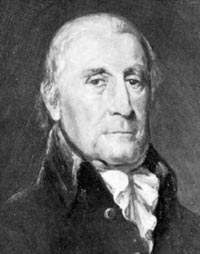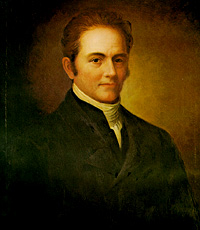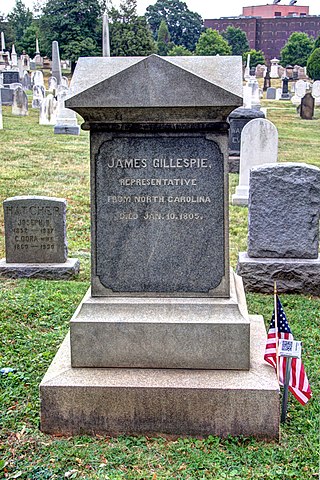| |||||
| Decades: | |||||
|---|---|---|---|---|---|
| See also: | |||||
| 1776 in the United States |
| 1776 in U.S. states |
|---|
| States |
| List of years in the United States by state or territory |
This is a list of events in the year 1776 in the U.S. state of Georgia.
| |||||
| Decades: | |||||
|---|---|---|---|---|---|
| See also: | |||||
| 1776 in the United States |
| 1776 in U.S. states |
|---|
| States |
| List of years in the United States by state or territory |
This is a list of events in the year 1776 in the U.S. state of Georgia.

Henry Middleton was an American politician and planter from South Carolina. A member of the colonial legislature, during the American Revolution he attended the First Continental Congress and served as that body's president for four days in 1774 after the passage of the Continental Association, which he signed. He left the Second Continental Congress before it declared independence. Back in South Carolina, he served as president of the provincial congress and senator in the newly created state government. After his capture by the British in 1780, he accepted defeat and returned to the status of a British subject until the end of the war.

The Declaration of Independence, formally titled The unanimous Declaration of the thirteen united States of America in both the engrossed version and the original printing, is the founding document of the United States. On July 4, 1776, it was adopted unanimously by the 56 delegates to the Second Continental Congress, who convened at the Pennsylvania State House, later renamed Independence Hall, in the colonial era capital of Philadelphia.

Arthur Middleton was a Founding Father of the United States, signer of the United States Declaration of Independence, and a representative from South Carolina in the Second Continental Congress.

Button Gwinnett was a British-born American Founding Father who, as a representative of Georgia to the Continental Congress, was one of the signers of the United States Declaration of Independence. Gwinnett was also, briefly, the provisional president of Georgia in 1777, and Gwinnett County was named for him. He was named in honor of his mother’s cousin, Barbara Button, who became his godmother. Gwinnett was killed in a duel by rival Lachlan McIntosh following a dispute after a failed invasion of East Florida.

Francis Lewis was an American merchant and a Founding Father of the United States. He was a signatory of the United States Declaration of Independence and Articles of Confederation as a representative of New York in the Continental Congress.

Langdon Cheves was an American politician, lawyer and businessman from South Carolina. He represented the city of Charleston in the United States House of Representatives from 1810 to 1815, where he played a key role on the home front of the War of 1812. Cheves was a leader among the War Hawk faction of the House. He served as chairman of the Committees on Naval Affairs and Ways and Means under Speaker of the House Henry Clay, then succeeded Clay as Speaker in the war's final stages. After leaving the House, he served as President of the Second Bank of the United States from 1819 to 1822.

The Second Continental Congress was the late-18th-century meeting of delegates from the Thirteen Colonies that united in support of the American Revolution and the Revolutionary War, which established American independence from the British Empire. The Congress constituted a new federation that it first named the United Colonies, and in 1776, renamed the United States of America. The Congress began convening in Philadelphia, on May 10, 1775, with representatives from 12 of the 13 colonies, after the Battles of Lexington and Concord.
Reverend John Joachim Zubly, born Hans Joachim Züblin, was a Swiss-born American pastor, planter, and statesman during the American Revolution. Although a delegate for Georgia to the Continental Congress in 1775, he resisted independence from Great Britain and became a Loyalist.

The Founding Fathers of the United States, commonly referred to as the Founding Fathers, were a group of late-18th-century American revolutionary leaders who united the Thirteen Colonies, oversaw the War of Independence from Great Britain, established the United States of America, and crafted a framework of government for the new nation.

Archibald Stobo Bulloch was an American lawyer, military officer and politician who served as the seventh governor of Georgia from 1776 to 1777. Born in the Province of South Carolina, Bulloch fought in the Georgia Militia during the American Revolution, and was also a great-grandfather of Martha Bulloch Roosevelt, and great-great-grandfather of Theodore Roosevelt, the 26th President of the United States.

James Gillespie was an American lawyer, politician, and Revolutionary War veteran from North Carolina. He was first elected to the U.S. House of Representatives in 1793 and died in office on January 10, 1805. Prior to serving in the U.S. Congress, Gillespie was a member of the North Carolina House of Commons, the North Carolina Senate, the North Carolina Council of State, and held various other positions in the state government. An ardent Anti-Federalist, he voted twice against the ratification of the U.S. Constitution.

John Houstoun was an American lawyer and statesman from Savannah, Georgia. He was one of the original Sons of Liberty and also a delegate for Georgia in the Second Continental Congress in 1775. He was the Governor of Georgia, in 1778, and again in 1784–1785.
William Bellinger Bulloch was an American Senator from Georgia. He was the youngest son of Archibald Bulloch, uncle to James Stephens Bulloch, granduncle to James Dunwoody Bulloch, Martha Bulloch Roosevelt, and Irvine Stephens Bulloch, great-granduncle to President Theodore Roosevelt, Jr. and Elliott Roosevelt, and great-great-granduncle to First Lady of the United States Eleanor Roosevelt.

Cowles Mead was a United States representative from Georgia. Born in Virginia, he received an English education and became a private practice lawyer.

1776 (MDCCLXXVI) was a leap year starting on Monday of the Gregorian calendar and a leap year starting on Friday of the Julian calendar, the 1776th year of the Common Era (CE) and Anno Domini (AD) designations, the 776th year of the 2nd millennium, the 76th year of the 18th century, and the 7th year of the 1770s decade. As of the start of 1776, the Gregorian calendar was 11 days ahead of the Julian calendar, which remained in localized use until 1923.
1776 is celebrated in the United States as the official beginning of the nation, with the Declaration of Independence of the Thirteen Colonies from the British Empire issued on July 4.

Colonial Park Cemetery is a historic cemetery located in downtown Savannah, Georgia. It became a city park in 1896, 43 years after burials in the cemetery ceased.
In the first half of 1776, the Thirteen Colonies individually declared independence from the British Empire. On July 4, the Declaration of Independence marked the beginning of the United States.
This is a list of events in the year 1776 in Delaware.
This is a list of events in the year 1776 in Pennsylvania.